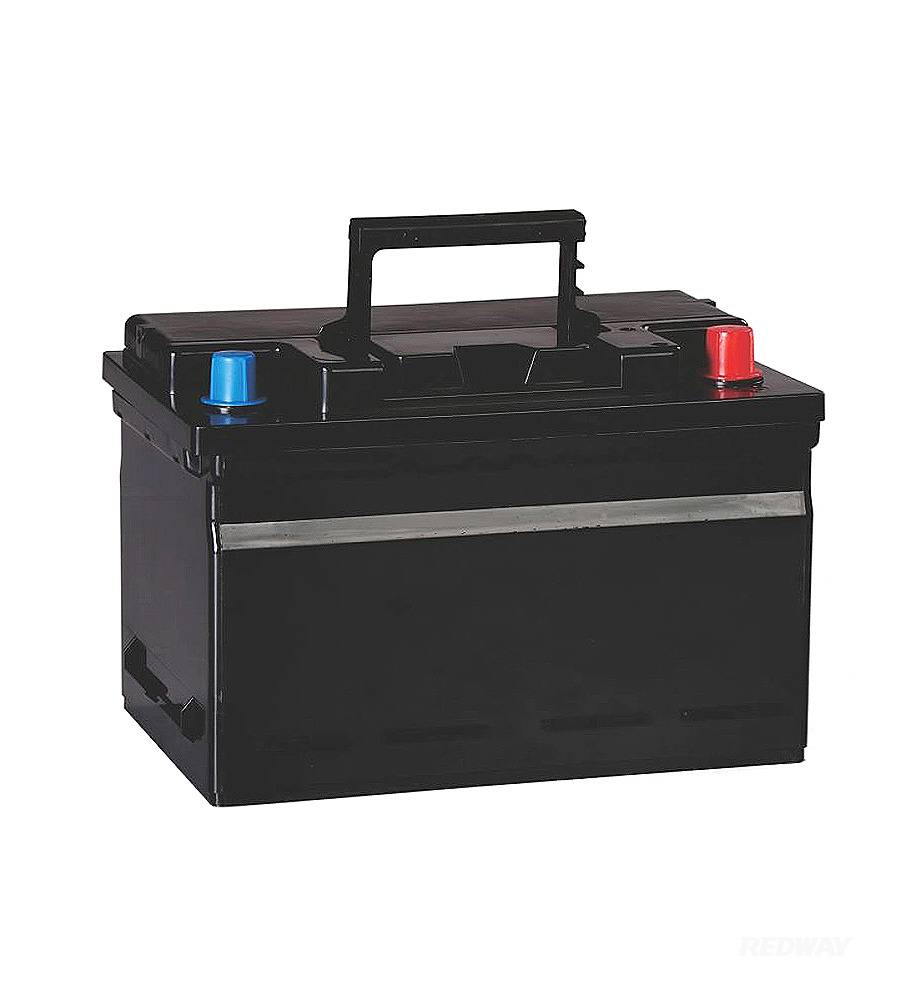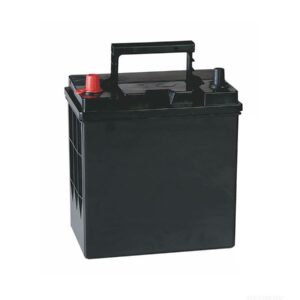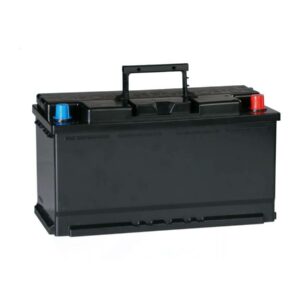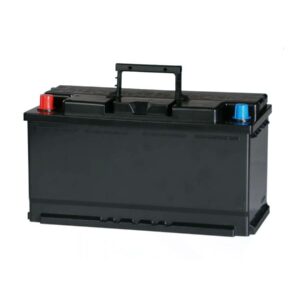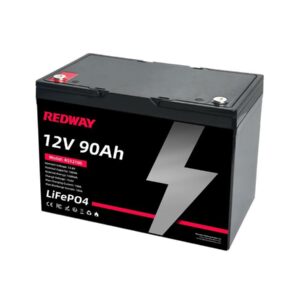Description
Our lithium battery manufacturer offers the 12V 60Ah LiFePO4 Car Starting Battery, an advanced power solution. It combines high performance, reliability, and versatility, ideal for OEM and wholesale buyers.
Key Features
- High Cranking Power: Offers a 1000A peak current and 800 CCA, ensuring engine starts in extreme weather.
- Lightweight Design: Weighing just 8.0 kg, it’s much lighter than lead – acid batteries, improving vehicle efficiency.
- Long Cycle Life: Engineered for over 3,000 cycles, reducing replacement frequency.
- Advanced Battery Management System (BMS): Protects against overcharging, short circuits, and overheating.
- Versatile Applications: Suitable for cars, trucks, RVs, and marine use, operating from – 20¡ãC to 65¡ãC.
Product Description
The 12V 60Ah LiFePO4 Car Starting Battery uses advanced LiFePO4 technology. With a rated voltage of 12.8V, 60Ah capacity, and 768Wh energy output, it fits various vehicles due to its compact size (242 x 176 x 189 mm). It supports a 100A charge and 200A discharge current. The durable ABS casing is lightweight. With a self – discharge rate of less than 2% per month and a 10 – year design life, it comes with a generous warranty. OEM clients can enjoy customization options, and orders are delivered within 25 days.
Benefits for OEM and Wholesale Buyers
For OEM customers, our lithium battery manufacturer provides extensive customization options. Silk – screen labeling and user manuals can be tailored to your needs. Our commitment to high – quality products and flexible delivery terms (FOB, EXW, CIF) make us a reliable partner for OEM battery requirements. Wholesale buyers can benefit from the long – term cost – effectiveness of our batteries with their long cycle life. Our lithium batteries offer a competitive edge in the market, ensuring reliable power for a wide range of automotive applications. Choose our manufacturer for all your battery needs, whether you’re an OEM or a wholesale buyer.
LiFePO4 CCA and Performance
What is LiFePO4 CCA rating for cold weather?
LiFePO4 batteries typically have lower CCA (Cold Cranking Amps) compared to lead-acid batteries, which may affect their ability to start an engine in extreme cold. However, they perform well in moderate cold temperatures and can maintain decent cranking power with the right Battery Management System (BMS) in place.
LiFePO4 vs lead-acid: which lasts longer in trucks?
LiFePO4 batteries last significantly longer in trucks compared to lead-acid. With proper maintenance, LiFePO4 batteries can last 5,000 cycles or more, whereas lead-acid batteries typically last between 500 to 1,000 cycles. This makes LiFePO4 more cost-effective in the long term for heavy-duty use.
Why choose LiFePO4 for automotive starting batteries?
LiFePO4 batteries offer higher efficiency, lighter weight, longer lifespan, and faster charging compared to lead-acid batteries. They are also safer, more durable, and can perform better over thousands of cycles, making them ideal for automotive starting applications.
How does LiFePO4 handle heavy-duty vehicle power needs?
LiFePO4 batteries are ideal for heavy-duty vehicles as they can handle high-power demands without significant voltage drops. Their lightweight and high energy density ensure consistent performance, making them a suitable option for commercial and fleet vehicles.
Are LiFePO4 batteries cheaper than lead-acid long-term?
While LiFePO4 batteries have a higher upfront cost, they are cheaper long-term due to their extended lifespan (3,000 to 5,000 cycles). This long cycle life reduces replacement and maintenance costs compared to lead-acid batteries, which last only 500 to 1,000 cycles.
Where to buy high CCA LiFePO4 car batteries?
High CCA LiFePO4 car batteries can be purchased from specialized battery suppliers, online marketplaces like Amazon or eBay, and authorized distributors of lithium battery brands. It’s important to choose a reputable seller to ensure the battery meets quality and safety standards.
Wholesale Pricing and Market Trends
What is current wholesale price for LiFePO4 automotive batteries?
The wholesale price for LiFePO4 automotive batteries typically ranges between $150 to $300 per battery, depending on the size, capacity, and manufacturer. Prices can fluctuate based on raw material costs, order volumes, and specific battery features.
How do raw material costs affect LiFePO4 battery pricing?
The price of LiFePO4 batteries is heavily influenced by the cost of raw materials like lithium, iron, and phosphate. Fluctuations in the global supply and demand for these materials can cause battery prices to rise or fall accordingly.
What factors differentiate LiFePO4 battery manufacturers’ pricing?
LiFePO4 battery pricing varies by manufacturer based on factors such as brand reputation, production quality, innovation, and technology (e.g., advanced Battery Management Systems or BMS). Other factors include manufacturing scale, supply chain efficiency, and regional market demand.
How do LiFePO4 battery wholesale prices vary by region?
Wholesale prices for LiFePO4 batteries can differ by region due to shipping costs, local tariffs, and demand. Additionally, regional manufacturing capabilities and government subsidies for electric vehicle (EV) infrastructure can also influence pricing.
What are future price trends for LiFePO4 automotive batteries?
The prices of LiFePO4 automotive batteries are expected to decrease over the next few years as raw material costs stabilize, production scales up, and technology advances. Market growth in electric vehicles (EVs) will also contribute to more competitive pricing.
How does production volume impact LiFePO4 battery costs?
Higher production volumes typically lead to economies of scale, lowering the cost per unit of LiFePO4 batteries. Larger orders and long-term contracts often result in discounts, making them more cost-effective for commercial and fleet purchases.
LiFePO4 vs Lead-Acid Comparison
Weight comparison of 12V 60Ah lithium vs lead-acid?
A 12V 60Ah LiFePO4 battery is much lighter than its lead-acid counterpart. While a lead-acid battery of the same capacity weighs around 40-50 pounds, a 12V 60Ah LiFePO4 battery typically weighs around 12-15 pounds, making it a significantly lighter option.
Lifespan cycles difference between lithium and lead-acid?
LiFePO4 batteries offer a much longer lifespan, typically 3,000 to 5,000 charge cycles, compared to lead-acid batteries, which usually last 500 to 1,000 cycles. This makes LiFePO4 a more durable and cost-effective option over time.
Cost analysis: lithium vs lead-acid for 12V 60Ah?
Though the initial cost of a 12V 60Ah LiFePO4 battery is higher than lead-acid, its long lifespan (3,000+ cycles) and low maintenance needs make it more cost-effective in the long run. Lead-acid batteries may cost less upfront but require more frequent replacements.
Charging time differences in lithium vs lead-acid?
LiFePO4 batteries charge much faster than lead-acid batteries. A 12V 60Ah LiFePO4 battery can typically charge in 3-5 hours, while a lead-acid battery of the same capacity may take 6-12 hours to fully charge, depending on the charger.
Energy efficiency comparison between both battery types?
LiFePO4 batteries are more energy-efficient than lead-acid batteries, with a round-trip efficiency of around 95%. Lead-acid batteries generally have an efficiency of 70-80%, which means LiFePO4 batteries lose less energy during charging and discharging cycles.
Which applications favor lithium over lead-acid 12V 60Ah?
Applications requiring lighter weight, longer cycle life, and faster charging benefit from lithium (LiFePO4) batteries. These include electric vehicles, RVs, boats, and renewable energy storage systems, where longevity and efficiency are key.
LiFePO4 Starting Batteries
What are LiFePO4 starting batteries’ key advantages?
LiFePO4 starting batteries are lighter, longer-lasting, and more efficient than lead-acid batteries. They provide faster charging times, greater energy density, and better performance over thousands of cycles, making them ideal for automotive starting and heavy-duty applications.
How do LiFePO4 batteries compare to lead-acid for trucks?
LiFePO4 batteries outperform lead-acid batteries in trucks due to their longer lifespan, faster charging, and lighter weight. While lead-acid batteries may offer higher cold cranking amps (CCA) in extreme cold, LiFePO4 batteries excel in long-term performance and energy efficiency.
Are LiFePO4 batteries safer for heavy-duty vehicle applications?
LiFePO4 batteries are safer than lead-acid batteries due to their inherent thermal stability and safer chemistry. They are less prone to overheating or catching fire, making them a safer option for heavy-duty vehicle applications, particularly in harsh environments.
What temperature ranges affect LiFePO4 truck batteries’ performance?
LiFePO4 truck batteries typically operate well within temperatures ranging from -20°C to 60°C. However, their performance may degrade in extremely cold temperatures, affecting CCA. Advanced BMS systems can help mitigate temperature-related performance issues.
Why choose LiFePO4 over other lithium chemistries for trucks?
LiFePO4 is chosen for truck applications due to its superior safety, longer cycle life, better thermal stability, and more efficient energy storage compared to other lithium chemistries. It is less likely to overheat or catch fire, making it ideal for high-demand vehicles.
What maintenance do LiFePO4 starting batteries require for trucks?
LiFePO4 starting batteries require minimal maintenance. Regularly checking charge levels, cleaning terminals, and ensuring proper storage conditions are key. Avoid deep discharges and extreme temperatures to extend the battery’s lifespan.
LiFePO4 Automotive Battery Advantages
What are key advantages of 12V LiFePO4 automotive batteries?
12V LiFePO4 automotive batteries offer longer lifespan, lighter weight, faster charging, and higher energy density compared to lead-acid batteries. They are also more environmentally friendly and require less maintenance, providing greater long-term value for automotive applications.
How does LiFePO4 chemistry extend battery lifespan in vehicles?
LiFePO4 chemistry is more stable and has a higher cycle life compared to lead-acid. This allows for up to 5,000 cycles, significantly extending the battery’s lifespan and making it more durable over time.
What temperature ranges optimize LiFePO4 automotive battery performance?
LiFePO4 automotive batteries perform optimally in temperatures between 0°C and 45°C. Extreme cold can affect their CCA, while extreme heat can degrade their lifespan. Proper temperature management is important for maximizing battery efficiency.
How do LiFePO4 batteries compare to lead-acid in cold climates?
LiFePO4 batteries generally perform well in moderate cold but may have reduced cold cranking amps (CCA) in extreme temperatures. Lead-acid batteries perform better in extreme cold, but LiFePO4 batteries excel in longevity, efficiency, and fast charging.
What maintenance practices maximize LiFePO4 automotive battery longevity?
To maximize the lifespan of a LiFePO4 automotive battery, regularly monitor the charge levels, clean terminals, avoid deep discharges, and store the battery in a temperature-controlled environment. Proper charging and using an appropriate Battery Management System (BMS) are also essential.
Are LiFePO4 automotive batteries compatible with standard charging systems?
LiFePO4 automotive batteries require a specific charging profile and may not be fully compatible with standard lead-acid chargers. A dedicated LiFePO4 charger is recommended to ensure proper charging and prevent overcharging, which could damage the battery.

